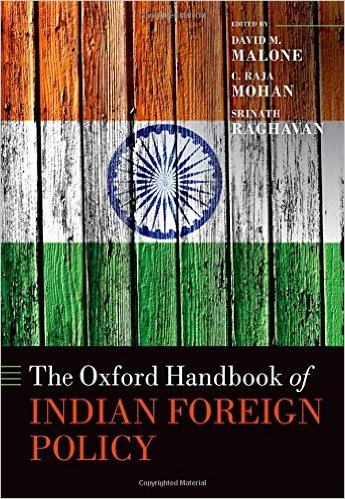Source: Oxford University Press
Following the end of the Cold War, the economic reforms in the early 1990s, and ensuing impressive growth rates, India has emerged as a leading voice in global affairs, particularly on international economic issues. Its domestic market is fast-growing and India is becoming increasingly important to global geo-strategic calculations, at a time when it has been outperforming many other growing economies, and is the only Asian country with the heft to counterbalance China. Indeed, so much is India defined internationally by its economic performance (and challenges) that other dimensions of its internal situation, notably relevant to security, and of its foreign policy have been relatively neglected in the existing literature.
This handbook, edited by David M. Malone, C. Raja Mohan, and Srinath Raghavan, presents an innovative, high profile volume, providing an authoritative and accessible examination and critique of Indian foreign policy. The handbook brings together essays from a global team of leading experts in the field to provide a comprehensive study of the various dimensions of Indian foreign policy.Table of Contents
Section I: Introduction
1. India and the World
David M. Malone, C. Raja Mohan and Srinath Raghavan
2. Five Approaches to the Study of Indian Foreign Policy
Kanti Bajpai
3. Theorising India's Foreign Relations
Siddhartha Mallavarapu
Section II: Evolution of Indian Foreign Policy
4. Foreign Policy of the Raj and its Legacy
Sneh Mahajan
5. Ideas about Foreign Policy Before Independence
Rahul Sagar
6. Establishing the Ministry of External Affairs
Pallavi Raghavan
7. Nehru's Foreign Policy: Idealism and Realism Conjoined?
Andrew Kennedy
8. Indira Gandhi's Foreign Policy: Hard Realism?
Surjit Mansingh
9. At the Cusp of Transformation: The Rajiv Gandhi Years, 1984-89
Srinath Raghavan
10. Foreign Policy After 1990: Transformation Through Incremental Adaptation
C. Raja Mohan
11. India's National Security
Sumit Ganguly
12. Resources
Ligia Norohna
13. India's International Development Program
Rohan Mukherjee
14. India's Soft Power
Rani Mullen
Section III: Institutions and Actors
15. State and Politics
Paul Staniland and Vipin Narang
16. The Parliament
Rudra Chaudhuri
17. Officialdom
Tanvi Madan
18. The Private Sector
Rajiv Kumar
19. The Media in the Making of Foreign Policy
Manoj Joshi
20. Think-Tanks, Universities
Amitabh Mattoo and Rory Medcalf
21. Mother India and Her Children Abroad: The Role of the Diaspora in India's Foreign Policy
Latha Varadarajan
22. Public Opinion
Devesh Kapur
23. Indian Scientists in Defence and Foreign Policy
Jaideep A. Prabhu
24. The Economic Imperatives Shaping India's Foreign Policy
Section IV: Geography
25. India and the Region
Stephen Cohen
26. China
Alka Acharya
27. India's Policy Towards Pakistan
Rajesh Basrur
28. Bangladesh
Krishnan Srinivasan and Sreeradha Dutta
29. India's Nepal Policy
S.D. Muni
30. India-Sri Lanka Equation: Geography as Opportunity
V. Suryanarayan
31. India's Bifurcated Look in Central Eurasia: The Central Asian Republics
Emilian Kavalski
32. The Persian Gulf
Talmiz Ahmad
33. India's 'Look East' Policy
Amitava Acharya
34. The Indian Ocean as India's Ocean: Geopolitics and Geoeconomic Drivers for the 21st Century
David Scott
Section V: Key Partnerships
35. US-India Relations: The Struggle for an Enduring Partnership
Ashley Tellis
36. Western Europe
Christian Wagner
37. The Russian Federation: The Anatomy and Evolution of a Relationship
Rajan Menon
38. Brazil: Fellow Traveller on the Long and Winding Road to Grandeza
Varun Sahni
39. Israel: A Maturing Relationship
P.R. Kumaraswamy
40. India and South Africa
Kudrat Virk
41. Unbreakable Bond: Africa in India's Foreign Policy
Constantino Xavier
Section VI: Multilateral Diplomacy
42. India and Global Governance
Poorvi Chitalkar and David M. Malone
43. India and the United Nations- or Things Fall Apart
Manu Bhagavan
44. India and the International Financial Institutions
Jason Kirk
45. India's Contemporary Pluritalerism
Samir Saran
46. India in the International Trading System
Pradeep S. Mehta and Bipul Chatterjee
47. Multilateralism in India's Nuclear Policy: A Questionable Default Option
Rajesh Rajagopalan
48. Multilateral Diplomacy on Climate Change
Navroz Dubash and Lavanya Rajamani
Section VII: Looking Ahead
49. India's Rise: The Search for Wealth and Power in the 21st Century
Sunil Khilnani
50. Rising or Constrained Power? Why India Will Find It Difficult To Convert Economic Growth and Nuclear Capability into Power
Eswaran Sridharan
Advance Praise
“Indian foreign policy has been a relatively under-researched subject, due, in some measure, to the lack of authentic source material. However, there is a growing interest in the subject and the OUP Handbook does a creditable job of providing a comprehensive survey, spread over 50 chapters, of examining the origins and development of independent Indias engagement with the world ... the three editors have done a commendable job of providing a framework to what could easily have become an unwieldy collection.”
—The Indian Express
“This handbook of Indian foreign policy is a serious and substantial contribution to the debate on India's foreign policy approach and engagements in an era that is witnessing significant changes.”
—Frontline India
“...as a reference book about how India thinks of the world, and how India's engagement with the world has evolved, this is an indispensable volume. It is wide in its scope, diverse in its orientation, rich in its narrative of history and relationships, deep in its analytical insights, and has some of the biggest names working on India as contributors.”
—Hindustan Times




.jpg)
